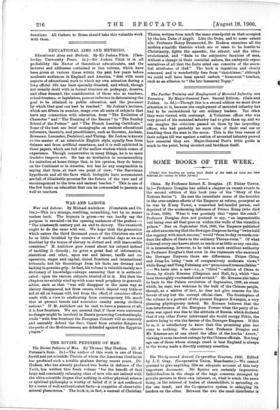SOME BOOKS OF THE WEEK.
[Under this heading we notice such Books of the week as have not been reserved for review in other forms.]
China. By Professor Robert K. Douglas. (T. Fisher Unwin. 5s.)—Professor Douglas has added a chapter on recent events to the second edition of this book (one of the " Story of the Nations Series "). He sees the immediate cause of the troubles in the over-zealous efforts of the Emperor at reform, prompted as he was by K'ang Yuwei, a somewhat hot-headed person, and deprived of the moderating influence of Prince Kung (who died in June. 1898). What it was precisely that "upset the coach" Professor Douglas does not pretend to say, "an impenetrable veil being over all that goes on within the walls of the vermilion palace." But on September 21st, 1898, the Emperor published an edict announcing that the Dowager-Empress having "twice held the regency with much success," would "from to-day onwards con- duct the affairs of State in the ordinary Throne-room." Of what followed every one knows about as much or as little as any one else. It is interesting, however, to be told on such excellent authority as Professor Douglas's that even in the statesmen who surround the Dowager Empress there are differences. Prince Ching and Jung-Lu being "men of comparatively moderate views," while Kangi and Tung Fuhsiang are " pronounced irreconcilables." —We have also a new—i.e., a "third "—edition of China in Decay, by Alexis Krausse (Chapman and Hall, 5s.), which "has been thoroughly overhauled and revised." Mr. Krausse also takes us back to the Palace revolution of September, 1898, an event which, he says, was welcome to the bulk of the Chinese people, though, as a matter of fact, he does not give reasons for the favour of any but the corrupt official class. The frontispiece of the volume is a portrait of the present Emperor Kwangsu, a very pleasing physiognomy indeed. Mr. Krausse believes that the non-interference of the European Powers when the party of re- form was upset was due to the attitude of Russia, which declared that if any other Power intervened she would occupy Pekin, the motive being to win the favour of the Dowager-Empress. If this be so, it is satisfactory to know that this promising plan has come to nothing. We observe that Professor Douglas and Mr. Krausse are at one about the affair of the lorcha ' Arrow,' viewing it as an insolent outrage by the Chinese officials. Not long ago one of those whose strange creed is that England is always in the wrong made a directly contrary assertion.


































 Previous page
Previous page